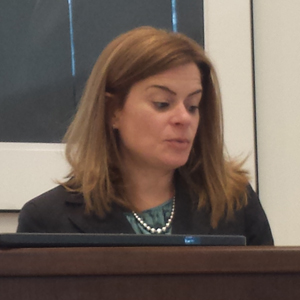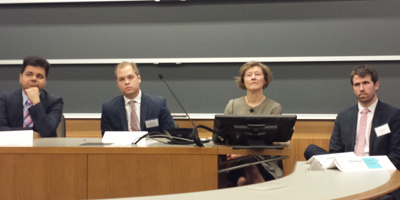AJLM Symposium Examines Global Infectious Diseases
Top scholars and industry leaders offer perspectives on challenges and solutions.
With emerging global awareness of the Zika virus and the recent Ebola epidemic in West Africa, Boston University School of Law’s American Journal of Law and Medicine Symposium on Global Infectious Diseases couldn’t have focused on a timelier subject.
Held January 30, 2016, the conference featured panels on topics at the intersection of public health and law. Kevin Outterson, N. Neal Pike Scholar in Health and Disability Law and co-director of BU Law’s health law program, delivered welcoming remarks and introductions for each panel, and Melissa Stundick, head of strategic alliances at Spero Therapeutics and former chief of the Anti-Infectives Program at the Biomedical Advanced Research and Development Authority (BARDA), presented over lunch.
Global health challenges: reality v. perception in new drug incentives

Stundick spoke about governmental incentives for creation of new drugs, and about Spero Therapeutics’ ongoing antibiotics research. Noting that due to alarming new outbreaks like Zika and Ebola, the need for new antibiotic development is not always at the forefront of drug policymakers’ minds, she asserted it should not be set aside. To illustrate her point, she compared the number of deaths from Ebola since the recent outbreak began—around 12,000—to deaths from drug-resistant infections in the US alone—around 23,000 per year, or “the equivalent of a 747 crashing every couple of days.”
Citing a recent study that looked at whether people in the drug development field are effectively communicating the threat of antimicrobial resistance, Stundick remarked that “we’re doing a horrible job.” The general public fundamentally misunderstands the concept, she noted, explaining that it refers to bacteria resistant to drugs, not human bodies resistant to bacterial infections.
“We have to do a better job … so that [antimicrobial resistance] can get the kind of attention that Ebola and Zika do, without scaring people,” she said. She went on to discuss the “economic incentives for antibiotic development,” an intersection of her work with Spero and BARDA. She noted that mandating a specific type of incentive—either “push incentives,” offered prior to a drug’s approval, or “pull incentives,” which occur post-approval—are unlikely to please everyone.
“We believe that we should let entities do what they’re good at,” she said, and pharmaceutical companies are good at drug distribution. “From the small biotech startup perspective, anything that allows the company to derive value could work” as an incentive. For example, tradeable vouchers that allow companies to extend their patent on a blockbuster drug by five years or offer “additional years of exclusivity.”
Stundick concluded that “any system that we create that is dependent on federal government funding is risky,” because the government pays attention to the hot issue of the moment—right now, that’s Zika, before that it was Ebola—where does that leave antimicrobial resistance?
Public health responses to infectious diseases

The rest of the conference addressed a range of themes related to global infectious disease, such as the lessons learned from the Ebola epidemic, and antibiotic and vaccine development. In a panel on public health response to infectious diseases, Byron Carson of the George Mason University Department of Economics delivered a paper entitled “Private Malaria Prevention in the United States, 1910–1920.” He examined case studies to explain why firms of the era would advocate for disease prevention. Most histories of malaria prevention focus on government action, he said, but there is an incentive today to look at private actors, noting that “private incentives and public health goals are more aligned than we think.”
Michael Sinha, of Boston Medical Center presented “The Perils of Panic: Ebola, HIV, and the Intersection of Global Health and Law,” based on his paper with Professor Wendy Parmet of Northeastern University School of Law. Sinha discussed the widespread panic in the early years of HIV/AIDS and how it mirrors the more recent reactions to the Ebola epidemic. Partially, he said, the fear of Ebola sprung from media descriptions of its symptoms as very similar to flu symptoms, and fearful responses from media and politicians.
Michael Ulrich, of Yale Law School, spoke on “Law and Politics, an Emerging Epidemic: The Need to Restore Science in Public Health Law,” asking “how, when science is missing, can law work as its own public health threat?” Like Sinha, he drew attendees’ attention to the panic around the Ebola virus as an example of a poor government response. “Exaggerated risks produce extreme responses,” he said.
Finally, Professor Wendy Mariner, of the Boston University School of Public Health and School of Law, presented “Beyond Lifestyle: Governing the Social Determinants of Health.” “I was struck with a number of parallels” between the ways chronic and infectious diseases are being reacted to, she said. These approaches emphasize behavior, overlook fundamental causes of disease, and are otherwise handled in a harmful way.
Mariner noted that “primal fear” of certain diseases may have served us very well thousands of years ago, but may not be so helpful today, when nearly 70 percent of deaths are from chronic, non-communicable diseases. With chronic diseases, “we tend to focus on the individual” and the choices we make, Mariner said, like diet and chronic alcohol use. “But the recognition of these is a double-edged sword. It can lead us to believe that all of these behaviors are individual choices. If [the residents of Flint, Michigan] get sick from the water, is that because they drank it themselves as a ‘personal choice’?” A human rights framework will help us address these issues by “improving the social determinants of health,” she concluded.
Events like the American Journal for Law & Medicine symposium offer scholars the opportunity to examine topics of critical importance to public health. The essays presented at the symposium will be available in a future edition of the American Journal for Law & Medicine. Please check the website in the coming months to read more about the ideas exchanged during this exciting event.
Reported by Jaime Margolis (’16).